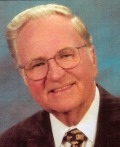By J.T. Pugh
Preachers are “ambassadors for Christ,” called to persuade people to be “reconciled to God” (II Corinthians 5:20). Paul said:
“For though I be free from all men, yet have I made myself servant unto all, that I might gain the more. And unto the Jews I became as a Jew, that I might gain the Jews; to them that are under the law, as under the law, that I might gain them that are under the law; to them that are without law, as without law. . . that I might gain them that are -without law. To the weak became I as weak, that I might gain the weak: I am made all things to all men, that I might by all means save some” (I Corinthians 9:19-22).
It is true that a preacher must do many things and be many things to many people while he is fulfilling the tenure of his service to the Lord, but woe to the one who loses sight of preaching as his first great responsibility. He has to be an administrator, a counselor, and a go-between, but his main business is preaching, and to that end he was called.
Where Pentecostal churches are unable to support themselves, and the pastor must work, it can usually be expected that the preaching will be less than it should be. This is not to the discredit of any good man who has the courage to extend his ministry into such adverse circumstances. The very fact that he is willing to carry the double load is a credit to him, but the fact stands that preaching, in order to be great, must be the main business of the preacher.
Often, after a week of toil, the working preacher feels the need of relaxation on Saturday evening. He may spend time with friends or relatives, until the minister at length observes that he must go study for the next day. But upon arriving home and looking over his Sunday school lesson, he finds himself more sleepy than he thought. So he promises himself to rise early and study more, but quite often he sleeps longer than intended. The morning of hurry about the house, not at all conducive to spiritual study, finds him having to thumb through his Bible on the way to church, hoping to find something that he can impart to the people. Preaching like this usually begets weak churches that are inattentive, bored, worldly, and sickly. This is not because the pastor wants it that way. Perhaps the day will come when ministers can be a greater help one to another and lighten the load of those who would like to employ themselves altogether in God’s good work.
If they are not careful, preachers who are well supported can also allow themselves to be sidetracked from the fulfillment of their holy calling. For instance, it is fatal to get involved in politics. The fortunes of a given party ebb and flow, and a church that has given its allegiance to one side or the other will find itself on the elevator of public opinion, its popularity either going up or down. The influence of the church should not be attached to things so unstable. History shows that when the church has played with politics, she has done so to her own hurt.
Our forefathers’ interest in this world was strictly limited. They counted themselves strangers and pilgrims upon this earth, seeking a city to come. It is always better to deal in eternal verities and not in temporal power structures. Before Pilate, Jesus simply stated, “My kingdom is not of this world: if my kingdom were of this world, then would my servants fight” (John 18:36). While the minister should be a good citizen and seek to improve his community, there is not a preacher who can fix the social structure of society. His primary duty lies in preaching the gospel.
A preacher should avoid the role of a secular crusader. On moral issues, his sentiment and vote should be for a safer and more respectable community, but the wise minister knows that conditions do not change
until people change, and the only thing that will affect that is the old-fashioned gospel.
The above article, “A Preacher Strives to Always Be at His Best,” is written by J.T. Pugh. The article was excerpted from Forward Magazine and is adapted from For Preachers Only by J.T. Pugh.
The material is most likely copyrighted and should not be reprinted under any other name or author. However, this material may be freely used for personal study or research purposes.


